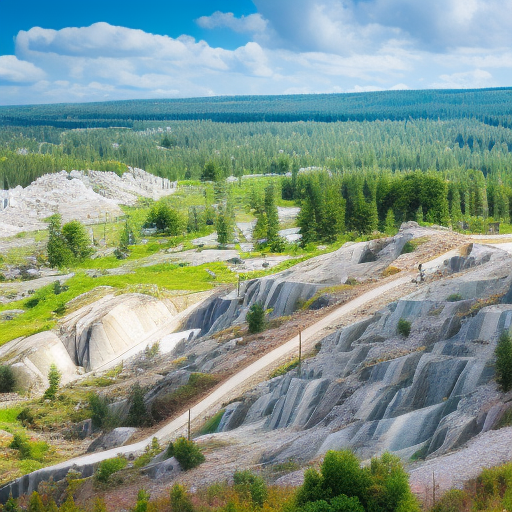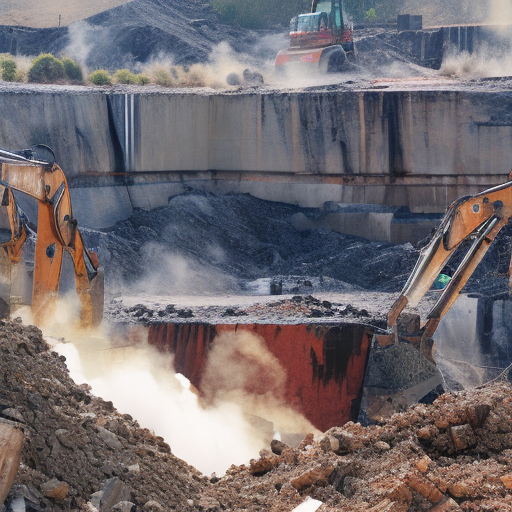When it comes to choosing countertops for our homes, granite has long been a popular choice. With its stunning natural beauty and durability, it’s no wonder that granite countertops have become a staple in kitchens and bathrooms across the globe. However, as our society becomes increasingly focused on environmental sustainability, concerns have been raised about the eco-friendliness of granite countertops. In this article, we will take a closer look at the environmental impact of granite countertops and evaluate the claims of their eco-friendliness. We will investigate the choices available to eco-conscious consumers and examine the various aspects of granite countertops that contribute to their environmental impact. So, if you’re considering going green with granite, keep reading to find out more about its true eco-friendly nature.
1. “Understanding the Environmental Impact of Granite Countertops: A Closer Look at the Eco-Friendliness”

Granite countertops have long been a popular choice among homeowners due to their durability and timeless beauty. However, it is essential to examine the environmental impact of granite countertops to determine their eco-friendliness.
One of the primary factors to consider when assessing the environmental impact of granite countertops is the extraction process. Granite is a natural stone that is quarried from the earth’s crust. This extraction process involves the use of heavy machinery, such as bulldozers and cranes, which consume a significant amount of energy. Additionally, the process of extracting granite often requires the removal of vegetation and topsoil, leading to soil erosion and habitat destruction.
Transportation also plays a crucial role in the environmental impact of granite countertops. Granite is typically sourced from distant locations, such as Brazil, India, or Italy, and then transported to the desired destination. The transportation process involves the burning of fossil fuels, which contributes to greenhouse gas emissions and air pollution.
Another aspect to consider is the energy consumption during the manufacturing and fabrication of granite countertops. The process of cutting and shaping granite slabs into countertops requires the use of powerful machinery and tools, which consume a significant amount of electricity. This energy consumption adds to the overall environmental footprint of granite countertops.
However, it is important to note that granite is a natural and durable material, which can contribute to its eco-friendliness. Granite countertops have a long lifespan, often lasting for several decades with proper care. This longevity reduces the need for frequent replacements, ultimately minimizing waste generation.
Furthermore, granite countertops are non-toxic and do not emit harmful substances into the air, making them a safe choice for indoor environments. They are also resistant to heat, scratches, and stains, eliminating the need for harsh cleaning chemicals or frequent repairs.
To mitigate the environmental impact of granite countertops, there are eco-friendly alternatives available. One option is to opt for locally sourced granite, which reduces transportation distances and associated emissions. Additionally, selecting granite countertops from certified sustainable quarries or choosing recycled granite can help minimize the environmental impact.
In conclusion, while the extraction, transportation, and manufacturing processes of granite countertops have environmental implications, their durability and non-toxic nature contribute to their overall eco-friendliness. By considering sustainable sourcing options and choosing long-lasting countertops, homeowners can make a conscious choice to minimize the environmental impact of granite countertops.
2. “Granite Countertops and the Environment: Evaluating the Eco-Friendly Claims”

Granite countertops have long been favored for their durability, beauty, and perceived eco-friendliness. However, it is essential to evaluate the validity of these claims and consider the environmental impact of granite countertops.
Granite is a natural stone that is extracted from quarries around the world. These extraction processes involve heavy machinery, blasting, and drilling, which can result in significant disruption to the surrounding ecosystems. Additionally, the transportation of granite slabs from quarries to manufacturing facilities and then to retailers contributes to carbon emissions and air pollution.
The energy-intensive process of transforming raw granite into countertops also raises concerns. Cutting, shaping, and polishing granite slabs require large amounts of electricity and water. The extraction and processing of granite can consume substantial energy resources, contributing to greenhouse gas emissions and depleting finite resources.
Furthermore, the mining of granite can lead to habitat destruction and soil erosion, affecting local flora and fauna. The extraction process may also result in the release of harmful chemicals and dust particles, further impacting air and water quality in nearby areas.
To address these environmental concerns, some granite suppliers have begun implementing sustainability practices. These practices may include using renewable energy sources for manufacturing processes, recycling water, and minimizing waste. Additionally, some companies prioritize working with quarries that follow responsible quarrying practices, minimizing the negative impact on the environment.
When considering the eco-friendliness of granite countertops, it is also important to evaluate their longevity and potential for reuse. Granite is known for its durability, and properly maintained countertops can last for decades. This longevity reduces the need for replacement, minimizing waste and the environmental impact associated with manufacturing new countertops.
To make a more informed decision about the eco-friendliness of granite countertops, it is crucial to consider the entire lifecycle of the product. This includes evaluating the environmental impact of extraction, processing, transportation, and disposal. Additionally, researching the specific practices of granite suppliers and manufacturers can provide insights into their commitment to sustainability.
In conclusion, while granite countertops offer undeniable beauty and durability, their eco-friendliness is a complex issue. The extraction and processing of granite can have a significant environmental impact, contributing to habitat destruction, air and water pollution, and greenhouse gas emissions. However, with the implementation of sustainable practices, such as responsible quarrying and energy-efficient manufacturing, the environmental footprint of granite countertops can be reduced. Evaluating the entire lifecycle of granite countertops and researching suppliers’ sustainability practices can help consumers make more informed choices regarding their environmental impact.
3. “Eco-Conscious Choices: Investigating the Environmental Impact of Granite Countertops”

Granite countertops have long been a popular choice for homeowners due to their durability and aesthetic appeal. However, in recent years, there has been growing concern about the environmental impact of using granite as a building material. As consumers become more eco-conscious, it is essential to investigate the environmental impact of granite countertops and determine whether they can truly be considered eco-friendly.
One of the primary environmental concerns associated with granite countertops is the extraction process. Granite is a natural stone that is mined from quarries, usually located in remote areas. The extraction of granite involves heavy machinery and blasting, which can cause significant damage to the surrounding environment. The use of these methods can result in soil erosion, deforestation, and habitat destruction, all of which have a negative impact on local ecosystems.
Furthermore, the transportation of granite from quarries to manufacturing facilities and then to retail locations also contributes to its environmental footprint. Shipping granite slabs over long distances consumes a significant amount of fuel, leading to greenhouse gas emissions and air pollution. Additionally, the packaging materials used to protect and transport granite countertops, such as foam and plastic, further contribute to waste and pollution.
Another environmental concern related to granite countertops is the energy-intensive manufacturing process. Turning raw granite into finished countertops requires cutting, polishing, and shaping the stone, all of which require significant amounts of energy. This energy is often derived from non-renewable sources, such as fossil fuels, which further contribute to carbon emissions and climate change.
However, it is important to note that not all granite countertops have the same environmental impact. Some companies are taking steps to mitigate the negative effects associated with granite extraction and manufacturing. These companies prioritize sustainable practices, such as reducing water consumption, using eco-friendly adhesives, and implementing recycling programs.
Additionally, choosing locally sourced granite can help reduce the environmental impact. By sourcing granite from nearby quarries, transportation distances can be minimized, reducing fuel consumption and emissions. Supporting local economies and businesses also has its own environmental benefits, such as reducing the carbon footprint associated with long-distance shipping.
In conclusion, while granite countertops may not be entirely eco-friendly, there are steps that can be taken to minimize their environmental impact. It is crucial for consumers to be aware of the potential negative consequences of using granite as a building material and make informed choices. By supporting companies that prioritize sustainability and opting for locally sourced granite, homeowners can make more eco-conscious decisions when it comes to their countertops.
4. “Going Green with Granite: Examining the Eco-Friendly Aspects of Countertop Materials”

Granite countertops have gained popularity in recent years due to their durability and aesthetic appeal. However, there is a growing concern about their environmental impact. As more individuals and businesses strive to adopt eco-friendly practices, it becomes essential to examine the sustainability of countertop materials like granite.
One of the primary reasons granite is considered eco-friendly is its longevity. Granite countertops can last for several decades, making them a durable and sustainable choice. Unlike other materials that may need frequent replacement, granite can withstand the test of time, reducing the need for resource-intensive manufacturing processes.
Additionally, granite is a natural stone that is extracted from quarries. While the mining process does have some environmental impact, it is important to note that granite is a non-renewable resource. However, responsible quarrying practices can minimize the environmental damage associated with extraction. By choosing suppliers who adhere to sustainable mining practices, consumers can ensure that their granite countertops are sourced ethically.
Another eco-friendly aspect of granite is its low maintenance requirements. Unlike some synthetic materials, granite does not require harsh chemicals or solvents for cleaning. Simple soap and water are usually sufficient to keep granite countertops looking pristine. This reduces the use of harmful chemicals that can be detrimental to both human health and the environment.
Furthermore, granite is a heat-resistant material, making it energy-efficient in the kitchen. It retains and distributes heat effectively, reducing the need for excessive energy consumption during cooking and baking. Additionally, granite’s natural cooling properties can help keep the kitchen cooler, reducing the reliance on air conditioning systems.
When considering the eco-friendliness of granite countertops, it is crucial to consider the entire lifecycle of the product. Proper disposal and recycling at the end of its life can further minimize its environmental impact. Recycling granite countertops can help reduce the demand for new materials and conserve natural resources.
In conclusion, while there are environmental concerns associated with the extraction and manufacturing of granite countertops, they offer several eco-friendly aspects that make them a sustainable choice. Their durability, low maintenance requirements, energy-efficiency, and potential for recycling contribute to their overall eco-friendly profile. By choosing responsibly sourced granite and practicing proper disposal methods, individuals can enjoy the beauty of granite countertops while minimizing their environmental impact.




